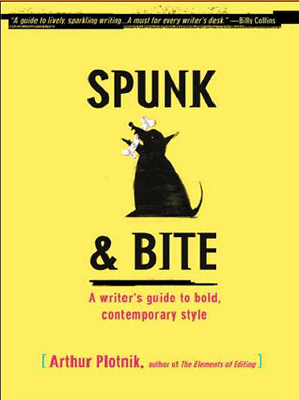 Should you ever desire to elevate your writing far beyond the oft-trampled pastures of Strunk and White’s The Elements of Style, then I boldly dare you to snap up a copy of Arthur Plotnik’s Spunk and Bite.
Should you ever desire to elevate your writing far beyond the oft-trampled pastures of Strunk and White’s The Elements of Style, then I boldly dare you to snap up a copy of Arthur Plotnik’s Spunk and Bite.
Don’t get me wrong— there are well-established reasons why Strunk and White’s tidy field manual on writing has been around since 1918, shepherding legions of struggling language users to relative safety (including me).
However, Spunk and Bite’s intent is to help writers break free the Strunk and White “strict formulation of correctness in English” by siccing our greatest creative impulses onto our oft clichéd and inert writing.
Says Plotnik:
Bending the rules can spring writers from ruts—get them out of themselves, out of the ordinary, and into prose that comes alive, gets notices, gets published.
So if The Elements of Style is the annual state fair, then Spunk and Bite is Cirque du Soleil. Plotnik escorts you through 31 kaleidoscopic and highly energetic chapters of writing advice that includes “How to Loot a Thesaurus,” “Upgrading Your Colors” and “Intensifiers for the Feeble.”
Despite what you may be thinking, Spunk and Bite is not a manifesto for laissez faire ‘creative writers.’ Quite the opposite, in fact. Plotnik contends that any writer in any vocation can benefit (so listen up bloggers):
Looking at all types of contemporary writing, Spunk and Bite distills the elements that make for punch and vivacity; it demonstrates enlivening techniques, including those spurned by conventional guideline; and it illustrates its advice with sparkling examples from our best writers.
And I’ll be the first to admit — I could still use heaps of Plotnik’s advice, as I often find myself raking through the same piles of words as if they were stale, turned leaves. Certainly if I could absorb the wisdom of Spunk and Bite as much as I’ve done with Strunk and White, I’d be the writer I’ve always dreamed of!
So why not give in to the $11.16 and buy yourself a copy Spunk and Bite. It will be sure to illuminate your way when the sordid clouds of writing set in, which they often do.
I close with these parting words, from Plotnik:
Kill, beat and burn—sniff out and destroy everything that smells predictable, clichéd, formulaic, labored, or lazy. Force yourself to fill the gaps with language that hoists a big exclamation point (but not a question mark) above the reader’s head.
[Links to books in this post are affiliate links.]


[…] This post was mentioned on Twitter by Charles Bohannan, Charles Bohannan. Charles Bohannan said: Wordful.com new blog Does Your Writing Ever Suck? Then Read This: Should you ever desire to elevate your writing f… http://bit.ly/adgU8C […]